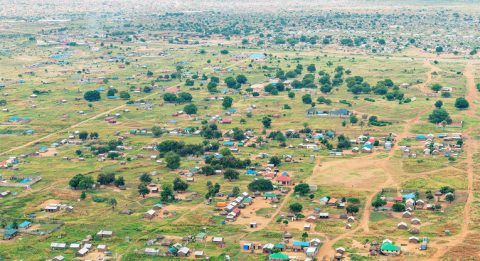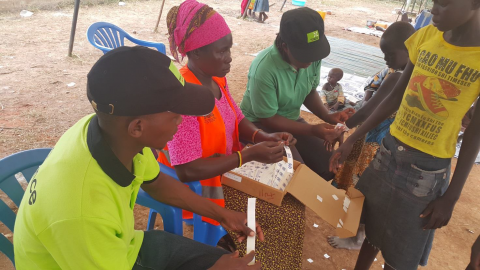South Sudan risks sliding into another civil war – FCA delivers food aid
FCA delivered food aid to thousands of people around South Sudan’s capital Juba. The security situation in the country is dire, and neighbouring Uganda struggles with massive amounts of refugees.
A shortage of food afflicts South Sudan’s capital Juba. Many stores are closed and markets destroyed.
Shopkeepers have quit their jobs because their supplies have been stolen. For what’s left prices have skyrocketed, says Marie Makweri, FCA’s peace coordinator in South Sudan.
FCA has delivered food aid, mostly beans, cornmeal, iodised salt, cooking oil and sugar, to more than 4 600 people around Juba during September. Some haven’t received any help since July’s surge in violence.
“The bulk of food supplies normally arrive from Uganda, but the roads have been closed for a long time”, Makweri says.
Humanitarian work increasingly dangerous
Violence has decreased in Juba since it peaked in July, but parts of the city are still unsafe. Dead and injured are almost a daily occurrence, and a lot less people are on the move, Makweri says. Plenty of houses have been raided or destroyed.
Working in South Sudan is ever more dangerous. 59 aid workers have died since December 2013. In July FCA was forced to evacuate most of its staff from Juba. Operations were continued in late August, and FCA’s food aid has mainly targeted areas most affected by the recent fighting.
The situation is however unstable and unpredictable. South Sudan is still at the brink of another civil war.

The surroundings of South Sudan’s capital Juba in December 2015.
Fighting has aggravated the country’s already critical humanitarian situation, according to FCA’s country manager Pio Ding. East Africa grapples with its worst drought in decades, and it has plunged South Sudan into a severe food crisis. Approximately four million South Sudanese depend on food aid.
“Because of the violence people are afraid to even farm or harvest what little they have”, he says.
Most of the aid recipients are women and children.
“Not all dare to travel to the cities for food, aware of the risk of being robbed.”
Reception centers reach bursting point
The agreement struck a year ago between the conflict parties, South Sudan’s president Salva Kiir and former vice president Riek Machar, is under threat. Clashes continue all over the country.
Armed groups bolster their ranks by recruiting and kidnapping child soldiers. Unicef estimates that around 16 000 children have ended up as fighters, and it believes that recruitment is gathering pace.
The number of internally displaced persons in South Sudan is past 1,6 million, and 800 000 people have fled the country. Neighbouring Uganda has received more than a third of the refugees.
The situation is stretching Uganda and aid organisations to their limits, says Kaisa Huhtela, FCA’s project coordinator in Uganda. Registration lags in Adjumani as reception centers are bursting at the seams. The town’s three centers received around 40 000 refugees in August, by far exceeding their total capacity of a few thousand. Tens of thousands more are expected to arrive in the autumn.
The centers struggle with a lack toilets, fresh water and food. WFP has cut food rations by a half for refugees who arrived before July, and further cuts are possible.
“One of our main priorities is to empty the temporary facilities consisting of tents in order to prevent cholera from spreading”, Huhtela says.

FCA staff giving bracelets to people who’ve received their vaccinations.
Many children arrive with their school books and look to continue their studies in Uganda. Of those who currently reside in for instance Pagrinya in Northern Uganda, around 70 per cent – a total of 20 000 – are school-aged children. Pagrinya however has only one elementary school.
FCA constructs classrooms and toilets in Pagrinya, as well as housing for teachers, meeting the demands of about 300 pupils and 12 teachers. Pagrinya would currently need an additional 300 classrooms.
Striving for a peaceful solution
In South Sudan FCA supports the Council of Churches in its peace work. The aim is to convince conflict parties to respect the peace agreement and July’s ceasefire deal. Commitments to a peaceful solution are urgently needed.
Despite the worsening circumstances for aid work, Pio Ding assures that FCA isn’t going anywhere from South Sudan.
“We stay. That’s the principle of our work. During a crisis the situation might receive some media attention, but even when the world isn’t watching, our work continues.”
Text: Erik Nyström